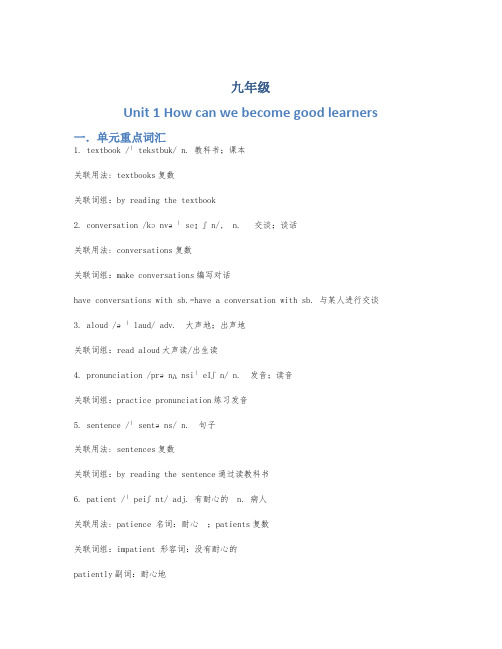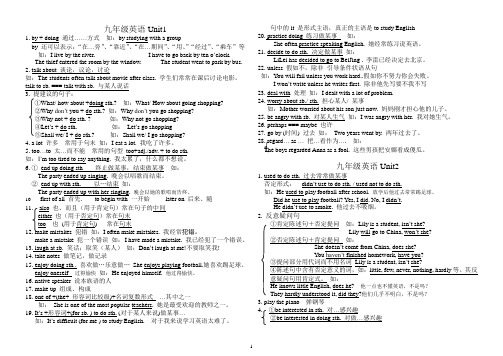新目标这初三Unit1复习资料
- 格式:doc
- 大小:73.50 KB
- 文档页数:4

九年级Unit 1 How can we become good learners一.单元重点词汇1.textbook /ˈtekstbuk/ n. 教科书;课本关联用法: textbooks复数关联词组:by reading the textbook2.conversation /kɔnvəˈs eɪʃn/, n. 交谈;谈话关联用法: conversations复数关联词组:make conversations编写对话have conversations with sb.=have a conversation with sb. 与某人进行交谈3.aloud /əˈlaud/ adv. 大声地;出声地关联词组:read aloud大声读/出生读4.pronunciation /prənʌnsiˈeIʃn/ n. 发音;读音关联词组:practice pronunciation练习发音5.sentence /ˈsentəns/ n. 句子关联用法: sentences复数关联词组:by reading the sentence通过读教科书6.patient /ˈpeiʃnt/ adj. 有耐心的 n. 病人关联用法: patience 名词:耐心;patients复数关联词组:impatient 形容词:没有耐心的patiently副词:耐心地be patient with sb.对某人有耐心be patient of sth.对某事能容忍have (no) patience with…对…(没)有耐心lose patience with 对…失去耐心out of patience 没有耐心7.expression /ikˈspreʃn/ n. 表达(方式);表示关联用法:expressions复数关联词组:facial expressions 面部表情8.discover /dIˈskʌvə (r)/ v. 发现;发觉关联用法:discovery 名词:发现9.secret /ˈsi:krət/ n. 秘密;adj. 秘密的;保密的关联用法:secrets复数关联词组:in secret秘密地;keep a secret保密;a secret plan秘密的计划10.look up (在词典,参考书中或通过电脑)查阅;抬头看11.fall in love with 爱上;与⋯⋯相爱12.grammar /ˈgræmə (r)/ n. 语法关联词组:in grammar在语法方面13.repeat /riˈpi:t/ v. 重复;重做关联用法:secrets复数关联词组:repetition名词:重复14.note /nəut/ n. 笔记;记录 v.注意;指出关联用法:notes复数关联词组:please note 清注意;take notes记笔记15.pal /pæl/ n.朋友;伙伴关联词组:penpal笔友16.physics /ˈfiziks/ n. 物理;物理学关联单词:adj. 物理的;身体的;物质的;根据自然规律的,符合自然法则的关联词组:Space Physics 空间物理学物理空间空间物理17.chemistry /ˈkemistri/ n. 化学关联词组:Organic Chemistry 有机化学18.memorize /ˈmeməˌraɪz/ v 记住;记忆关联单词:memory n.记忆关联用法:过去式 memorized过去分词 memorized现在分词 memorizing第三人称单数memorizes典型例句:Have you memorized your lines for the play yet?你记住剧本中的台词了吗?19.pattern /ˈpætn/, /ˈpætən/ n.模式;方式20.pronounce /prəˈnaʊns/ v. 发音关联用法:过去式 pronounced过去分词 pronounced现在分词pronouncing第三人称单数 pronounces关联词组:Pronounce correctly 发音正确正确发音典型例句:I can not pronounce correctly 我不能正确发音21.increase /Inˈkri:s/ v. 增加;增长关联用法:过去式 increased过去分词 increased现在分词 increasing复数 increases第三人称单数 increasesn. 增加;增多;增长关联词组:increase by 增加了;按…增长on the increase 正在增加,正在增长22.speed /spi:d/ n.速度 v.加速关联单词:speeding超速关联用法:过去式 sped或speeded过去分词 sped或speeded现在分词 speeding关联词组:speed up 加速加快速度使加速加快speed limit 速度限制时速限制限速最高车速23.partner /ˈpa:(r)tnə (r)/ n. 搭档;同伴24.born /bɔːn/ v.出生 adj.天生的关联词组:be born with 天生具有born yesterday 乳臭未干典型例句:Swift was born in 1667.斯威夫特生于1667年。

2020年春人教新目标英语九年级英语Unit1 How can we become good learners?短语归纳1.work with friends和朋友一起学习2.listen to tapes听磁带3.ask the teacher for help向老师求助4. have conversations with与…交谈/会话5. study for a test备考6.read aloud大声读7. word by word一字一字地,逐字地8. at first起初,起先9.the secret to……的秘诀10.speaking skills口语技巧11.spoken English英语口语12.a little有点儿13.give a report作报告14.so…that…如此…以至于…15.so that以便,为了16.fall in love with爱上…17.as well也18.something interesting有趣的事情19.instead of代替,而不是20. because of因为21.take notes记笔记22.the meaning of……的意思23.how often多久一次24.make mistakes犯错误25.a lot of许多26. get bored感到无聊/厌烦27. think about考虑28.even if即使,尽管29.be afraid of害怕30. look up查阅,抬头看31.each other互相,彼此32.find out找出,查明33. look for寻找34.be born with天生具有35.the ability to do sth做某事的能力36.depend on依靠,依赖,视…而定37.learning habits学习习惯38.be interested in对…感兴趣39.pay attention to注意,关注40.worry about担心,担忧41. be good at(doing)sth擅长(做)某事42. for example例如43.connect…with…把…和…联系起来44.do exercise做运动45.do exercises做练习46.at a/the speed of…以…的速度句型归纳:1、by doing sth通过做某事例:I learn by doing exercises.我通过做练习学习。

人教版新目标九年级英语上册unit 1 复习提纲人教版新目标九年级英语上册unit 1 复习提纲unit 1 How can we become good learners?by介词的用法:1.表示做某事的方法,by + 名词/代词/ doing , 对其划线提问用howI study English by watching English movies. How do you study English?2.by +交通工具,对其划线提问,用howI gl by bike. How do you glby+时间,不迟于,在…之前Please replletter by Fridaby 在…旁边 The teaanding by the windowby在被动语态中,引出动作的执行者:The book is written by Lu Xun.work wds 和朋友一起学习 make word groups制作单词卡片 read the textbook读课本 ask sb for help 向某人求助 study for a test 为考试做准备 work with a group 参加小组学习 have conversations with sb 和某人交谈,沟通= talk with sb read aloud朗读practice doing sth练习做某事 what about doing sth干某事怎么样?speaking skills口语技能glish 英语口语doing sth完成干某事give a report作报告 gain ideas 理解主要意思read word by word逐字阅读do sth设法做某事 try doing sth尝试做某事’s best to do sth尽某人最大努力做某事 be patient耐心点 be patient with sb 对某人有耐心(patient作为名词病人)find / make / think + it +adj (for sb)to do sth 发现/ 使/ 认为做某事对于某人来说是…的it为形式宾语,真正的宾语是to do . 如:I find it difficullearn English well…的秘密,…的秘诀Tuard w大多数时候 be afraid of doing sth 害怕做某事 be afraid to do 不敢做某事 because of + 名词性短语 because + 句子 fall in love with sb/ sth爱上某人/某物begin to do sth开始做某事 body language 肢体语言the exaces他们脸上的表情 key words关键词gg有趣的事情 look it / them up 查阅It’s aake.小菜一碟 It serves you right. 你活该 so thader that以便,为了have a better understanding of对…有更好的理解as well也, 用于句末,不需要逗号隔开 I like English as well也,用于,需要逗号隔开 I like Engla记笔记do ex做练习atterns 背句型a diadiaries写日记increaading speed提高我的阅读速度make mistakes 犯错 make mistakes in在某方面犯错如:make mistakes in grammarhave a paaglish with (介词with不可省略,与前面的partner存在逻辑上的动宾关系,如: awrite with, a paper to wa house to live in)be born with天生具有 be born in 出生在某地如:I was born in Anhuability to learn学习的能力 the ability to do sth做某事的能力depend on 取决于,依赖,依靠 learning habits 学习习惯have…有共同之处create a在某方面建立兴趣如: create aglay a注意,关注;后接名词/代词/doing (注意:to 为介词)…with…把…和…连接起来We shouldwhat we need to learn wgg.get bored 变得厌烦,无聊 Ulose it 不用就作废Practice ma孰能生巧evven though即使,尽管 keep doing sth持续做某事write down key words 写下关键词 draw mind maps 画思维图 explab 向某人解释bit by bit一点点地=little by little instead of doing sth代替做某事名言警句:wledgqug.知识来源于质疑。

九年级英语Unit11. by + doing 通过……方式如:by studying with a groupby 还可以表示:“在…旁”、“靠近”、“在…期间”、“用、”“经过”、“乘车”等如:I live by the river. I have to go back by ten o’clock.The thief entered the room by the window. The student went to park by bus.2. talk about 谈论,议论,讨论如:The students often talk about movie after class. 学生们常常在课后讨论电影。
talk to sb. === talk with sb. 与某人说话3. 提建议的句子:①What/ how about +doing sth.? 如:What/ How about going shopping?②Why don’t you + do sth.? 如:Why don’t you go shopping?③Why not + do sth. ? 如:Why not go shopping?④Let’s + do sth. 如:Let’s go shopping⑤Shall we/ I + do sth.? 如:Shall we/ I go shopping?4. a lot 许多常用于句末如:I eat a lot. 我吃了许多。
5. too…to 太…而不能常用的句型too+adj./adv. + to do sth.如:I’m too tired to say anything. 我太累了,什么都不想说。
6. ①end up doing sth 终止做某事,结束做某事如:The party ended up singing. 晚会以唱歌而结束。
②end up with sth. 以…结束如:The party ended up with her singing. 晚会以她的歌唱而告终。

![初三九年级新目标英语Unit1[PPT课件白板课件思维导图知识点知识树复习资料]](https://img.taocdn.com/s1/m/7748eaa971fe910ef12df849.png)
初三英语上册(人教新目标)Unit 1 How can we become good learners?知识点总结一、要点词汇conversation·原文再现Do you ever practice conversations with friends?你与朋友一同联系过会话吗?·基本用法n. conversation 谈话;讲话常常用于以下构造中:1. have/hold a conversation with sb与.某人讲话,Did you have a conversation with him?你和他谈过话了吗?2. make conversation with sb.I want to make conversation with her.我想和她讲话。
aloud·原文再现What about reading aloud to practice pronunciation?大声朗诵练习发音怎么样?·基本用法adv. aloud 大声地;大声地,常用来修饰动词。
When we were children, our father read aloud to us.我们小的时候,父亲会给我们朗诵。
·知识拓展 --词义辨析aloud/loud/loudly1.aloud adv. 作声“地”有使能听获得的意味。
如:Please read the story aloud.请朗诵这个故事。
They were shouting aloud.他们在大声地呼叫。
2.loud. adv. 大声“地,大声地,响亮地”,常指在谈笑等方面。
如:Don't talk so loud.不要这样大声地讲话。
Speak louder.说得大声点儿。
3.loudly adv. 大声“地”有时与 loud 通用,但含有喧杂的意味。
如:Someone knocked loudly at the door.有人大声叩门。
人教版新目标九年级全一册单元每页重点内容背诵U nit1 How can we bee good learners ?Section A 短语/句型Page11.bee a good learner成为一名优秀的学习者2.The ways you study English你学英语的方法3.Add other ways you sometimes study补充些你有时学习的方法4.Work with friends/a group朋友/小组互助学习5.Make word cards制作词汇卡片6.Listen to tapes听磁带(学习)7.Ask the teacher for help 向老师求助8.Study for a test备考9.I study by working with a group我是通过小组互助形式学习的Page21.have conversations with friends in English用英语和朋友交流2.Practice pronunciation/speaking English练发音/说3.Study with a group小组互助式学习4.Learn a lot (in)that way用那种方法学很多5.Improve my speaking skills提升我的说话技能6.Spoken English英语口语7. A little nervous有点紧张8.Finish reading a book读完一本书9.Give a report做报告10.A slow reader读书很慢11.Get the main ideas at first首先获取大意12.Read word by word逐字读13.Read word groups读词组14.Try to guess a word’s meaning努力去猜单词的含义15.Before and after the word该词前后16.Be patient with sb对某人有耐心17.Bee better 变得更好18.Read something you enjoy读点你喜欢的东西19.What about listening to tapes?=Why not listen to tapes?20.Have you ever studied with a group? 你曾参有过小组互助式学习吗?21.It’s too hard to understand spoken English=It's so hard that I can't understand spokenEnglish. 我很难听懂英语口语22.You probably understand more than you think.你很可能懂的比你想象的多23.Be patient. It takes time. 要有耐心,需要时间24.The more you read, the faster you’ll be. 你读的越多,你的速度会越快Page31.the secret to language learning= the secret of learning language 学语言的秘诀2.Learn to learn English 学会学英语3.Most of the time=most time 大多数时间4.Be afraid to ask questions怕问问题5.because of my poor pronunciation=Because I have poor pronunciation由于我发音不好6.Hide behind my textbook 躲在书后7. A movie called Toy Story 一部名叫玩具总动员的电影8.Fall in love with...爱上...9.Begin to watch other English movies=begin watching other English movies开始看其他英文电影10.Everything the characters said=What the characters said (电影)人物说的话11.The expressions on their faces=their facial expressions 他们的面部表情12.Help me to get the meaning 帮我我获取含义13.Listen for just the key words 只留意关键词14.Look the unknown words up in a dictionary 用词典查生词15.Have a better understanding of sth.= understand sth. better 更好的理解某事16.It’s a piece of cake. 小菜一碟17.It serves you right. 你活该18.I want to learn new words and more grammar so thatPage41.watch English programs看英文节目2.Repeat out loud 大声跟读3.Take notes 做笔记4.Do grammar exercises 做语法练习5.Write emails to my pen pals 给我的笔友写电邮6.Keep a diary 坚持写日记7.One way is by listening to tapes=One way is to listen to tapes一个办法就是听磁带Section B短语/句型Page51.pronounce some of the words 发一些的音2.Make mistakes in grammar 犯语法错误3.Get much writing practice进行大量的写作练习4.Get the pronunciation right 发音正确5. A partner to practice English with一个一起练英语的搭档6.I don’t know how to increase my reading speed=I don't know how I can increase myspeaking speed. 我不知道怎样提升我说话的速度Page61.learning habits of successful learners 成功学习者的学习习惯2.Be born with the ability to learn 天生具有学习能力3.Depend on 取决于/依靠4.Research shows that...=Studies show that... 研究表明...5.Have some good habits in mon有一些共同的好习惯6.Create an interest in what we learn培养我们对所学东西的兴趣7.Be interested in something 对某事感兴趣8.More active 更加积极9.Pay attention to it for a long time 长时间关注它10.Connect what we need to learn with something interesting 把我们需要学的和有趣的东西联系起来11.For example 例如12.Watch sports programs in English 观看英语体育节目13.Get bored 变得无聊e it or lose it 不用即失15.Even if=even though 即使16.Practice makes perfect 孰能生巧17.Be afraid of making mistakes 怕犯错18.Invent telephone overnight一夜之间发明19.Develop our study skills 培养我们的学习节能20.Draw mind maps画思维导图21.Review what we have learned 复习我们已学到的东西22.Explain the information to another student向另外一个学生解释信息23.During or after class 课间或课后24.Find ou t the answers 搞清答案缘由25.Learn wisely and learn well 明智的学好好的学26.Whether or not you can do this well depends on your learning habits.=Whether you cando this well or not depends on your learning habits. 是否能学的好取决于你的学习习惯27.Good learners think about what they are good at and what they need to practice more.优秀的学习者会考虑他们擅长的以及什么需要更多的练习28.You’ll forget it unless you use it=You'll forget it if you don't use it.如果你不用它就会忘记它29.He succeeded by trying many times and learning from his mistakes。
Unit 1一、知识点1.study for a test 为考试而学习study English 学习英语2.by: ①通过…..方式(途径)。
例:I learn English by listening to tapes.②在…..旁边。
例:by the window/the door③乘坐交通工具例:by bus/car④在……之前,到……为止。
例:by October在10月前⑤被例:English is spoken by many people.3.how与what的区别:how通常对方式或程度提问,意思有:怎么样、如何,通常用来做状语、表语。
what通常对动作的发出者或接受者提问,意思是为什么,通常做宾语,主语。
①How is your summer holiday? It’s OK.(how表示程度做表语)②How did you travel around the world? I travel by air.③What do you learn at school? I learn English, math and many other subjects.①What…think of…?How…like…?②What…do with…?How…deal with…?③What…like about…? How…like…?④What’s the weather like today? How’s the weather today?⑤ What to do? How to do it?e.g. What do you think of this book?=How do you like this book?I don’t know what I should do with the matter.=I don’t know how I should deal with it.What do you like about China?=How do you like China?I don’t know what to do next step?=I don’t know how to do it next step?㊣What good / bad weather it is today!(weather为不可数名词,其前不能加 a )㊣What a fine / bad day it is today! day为可数名词,其前要加a4. aloud, loud与loudly的用法:三个词都与"大声"或"响亮"有关。
①aloud是副词,重点在出声能让人听见,但声音不一定很大,常用在读书或说话上。
通常放在动词之后。
aloud没有比较级形式。
如: He read the story aloud to his son.他朗读那篇故事给他儿子听。
②loud可作形容词或副词。
用作副词时,常与speak, talk, laugh等动词连用,多用于比较级,须放在动词之后。
如:She told us to speak a little louder. 她让我们说大声一点。
③loudly是副词,与loud同义,有时两者可替换使用,但往往含有令人讨厌或打扰别人的意思,可位于动词之前或之后。
如: He does not talk loudly or laugh loudly in public.他不当众大声谈笑。
5. voice 指人的嗓音也指鸟鸣。
sound 指人可以听到的各种声音。
noise 指噪音、吵闹声6. find + 宾语+ 宾补(名词形容词介词短语分词等)例:I find him friendly. I found him working in the garden.We found him in bed. He found the window closed. We found her honest.7. 常见的系动词有:①是:am、is、are ②保持:keep、stay ③转变:become、get、turn④……起来feel、look、smell、taste、sound8. get + 宾语+宾补(形容词、过去分词、动词不定式)使某种情况发生例:Get the shoes clean. 把鞋擦干净;Get Mr. Green to come. 让格林先生进来I want to get my bike repaired. 我想去修自行车You can’t get him waiting. 你不能让他老等着9. 动词不定式做定语①与所修饰的名词构成主谓关系The next train to arrive was from New York. He is always the first to come.②与所修饰的名词构成动宾关系I have nothing to say. I need a pen to write with.I need some paper to write on. I don’t have a room to live in.10. practice , fun 做名词为不可数名词11. add 补充说又说12. join 加入某团体并成为其中一员attend 出席参加会议或讲座take part in指参加到某项活动中去。
13.all、both、always以及every复合词与not连用构成部分否定。
其完全否定为:all---none, both---neither, everything---nothing, everybody---nobody.14. be afraid of doing sth. / sth.害怕be afraid of being alonebe afraid to do sth.害怕;be afraid that恐怕担心,表示委婉语气15.either:①放在否定句末表示“也”;②两者中的“任一”③either…or…或者…或者.…引导主语部分,谓语动词按照就近原则plete完成,是个较正式的词,后不能接动名词;finish指日常事物的完成17.a,an 与序数词连用表示“又一”,“再一”。
例:Please give me a second apple. There comes a fifth girl.18.have trouble/difficult/problem (in) doing… 干…遇到麻烦,困难19.unless 除非,如果不,等于“if not”本身就表示否定,引导条件状语从句,主句为将来时,条件状语从句用一般现在时表示将来。
例:My baby sister doesn’t cry unless she’s hungry. =My baby sister doesn’t cry if she isn’t hungry.Unless you take more care, you’ll have an accident.如果你不多加小心的话,你会出事的。
20.instead: adv. 代替,更换。
例:We have no coffee, would you like tea instead?我们没有咖啡了,改喝茶好吗?It will take days by car, so let’s fly instead. 开车去要好几天呢,咱们还是坐飞机吧。
Tom was ill, so I went instead.汤姆病了,所以换了我去。
instead of (doing )sth. 作为某人或某事物的替换例:Let’s play cards instead of watching TV.We sometimes eat rice instead of potatoes. Give me the red one instead of the green one.21.spoken 口头的,口语的。
spoken English 英语口语speaking 讲话的,说某种语言的。
Speaking skills讲英语的能力22. 提建议的句子:①What/ how about +doing sth.? 如:What/ How about going shopping?②Why don’t you + do sth.? 如:Why don’t you go shopping?③Why not + do sth. ? 如:Why not go shopping?④Let’s + do sth.如:Let’s go shopping⑤Shall we/ I + do sth.? 如:Shall we/ I go shopping?23. a lot 许多常用于句末如:I eat a lot. 我吃了许多。
24. too…to 太…而不能常用的句型too+adj./adv. + to do sth.如:I’m too tired to say anything. 我太累了,什么都不想说。
25. not …at all 一点也不根本不如:I like milk very much. 我非常喜欢牛奶。
I don’t like coffee at all. 我一点也不喜欢咖啡。
not经常可以和助动词结合在一起,at all 则放在句尾26.be / get excited about sth.= be/get excited about doing sth. = be excited to do sth. 对…感兴奋如:I am / get excited about going to Beijing.=I am excited to go to Beijing. 我对去北京感到兴奋。
27. ①end up doing sth终止做某事,结束做某事如:The party ended up singing. 晚会以唱歌而结束。
②end up with sth. 以…结束如:The party ended up with her singing. 晚会以她的歌唱而告终。
28. first of all 首先;to begin with 一开始;later on 后来、随后29. also 也、而且(用于肯定句)常在句子的中间either 也(用于否定句)常在句末too 也(用于肯定句) 常在句末=as well30. make mistakes 犯错;mistake sb. for …把……错认为……make mistakes (in) doing sth. 在干某事方面出错;by mistake 错误地;由于搞错mistake---mistook----mistaken如:I often make mistakes. 我经常犯错。